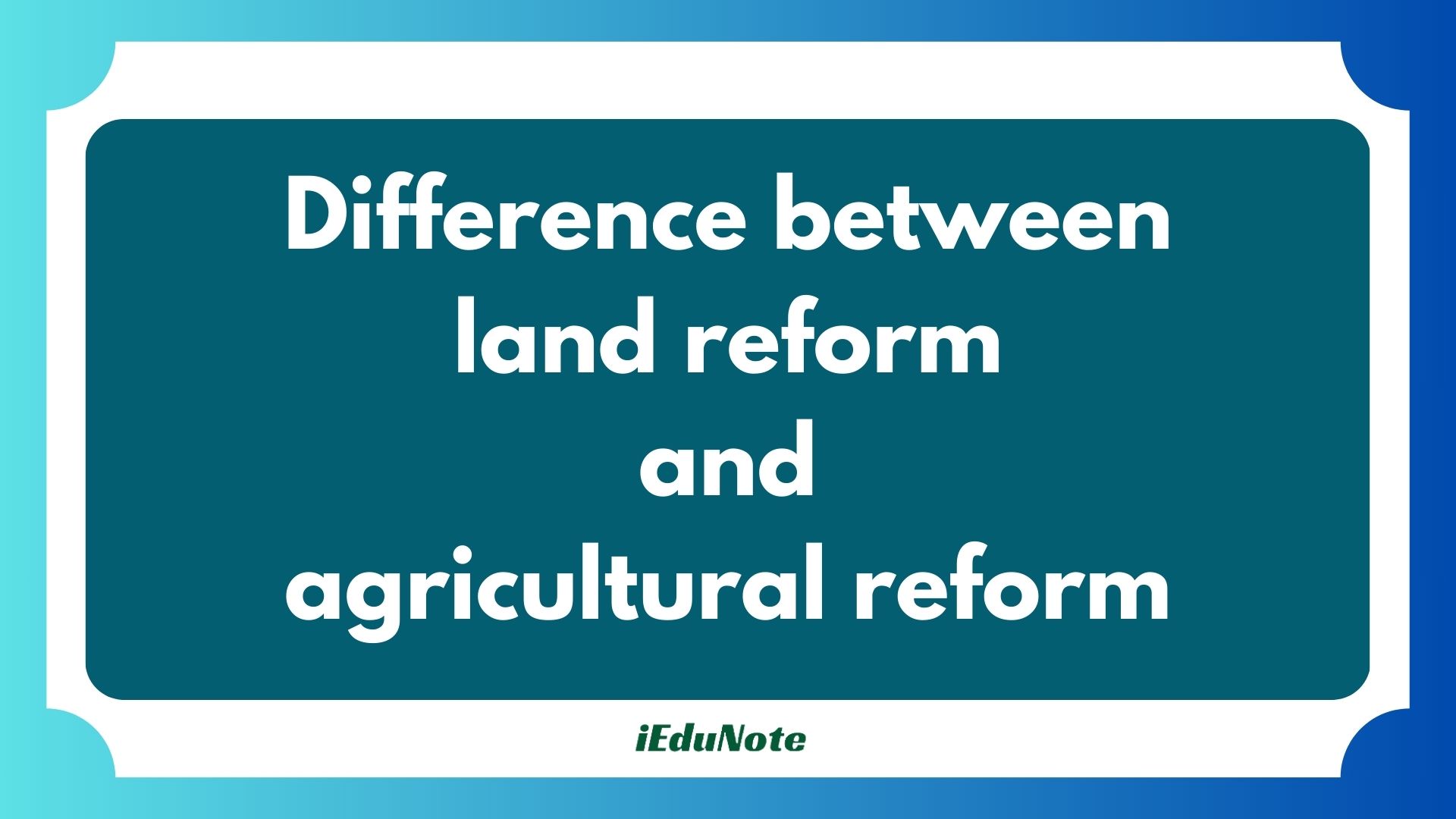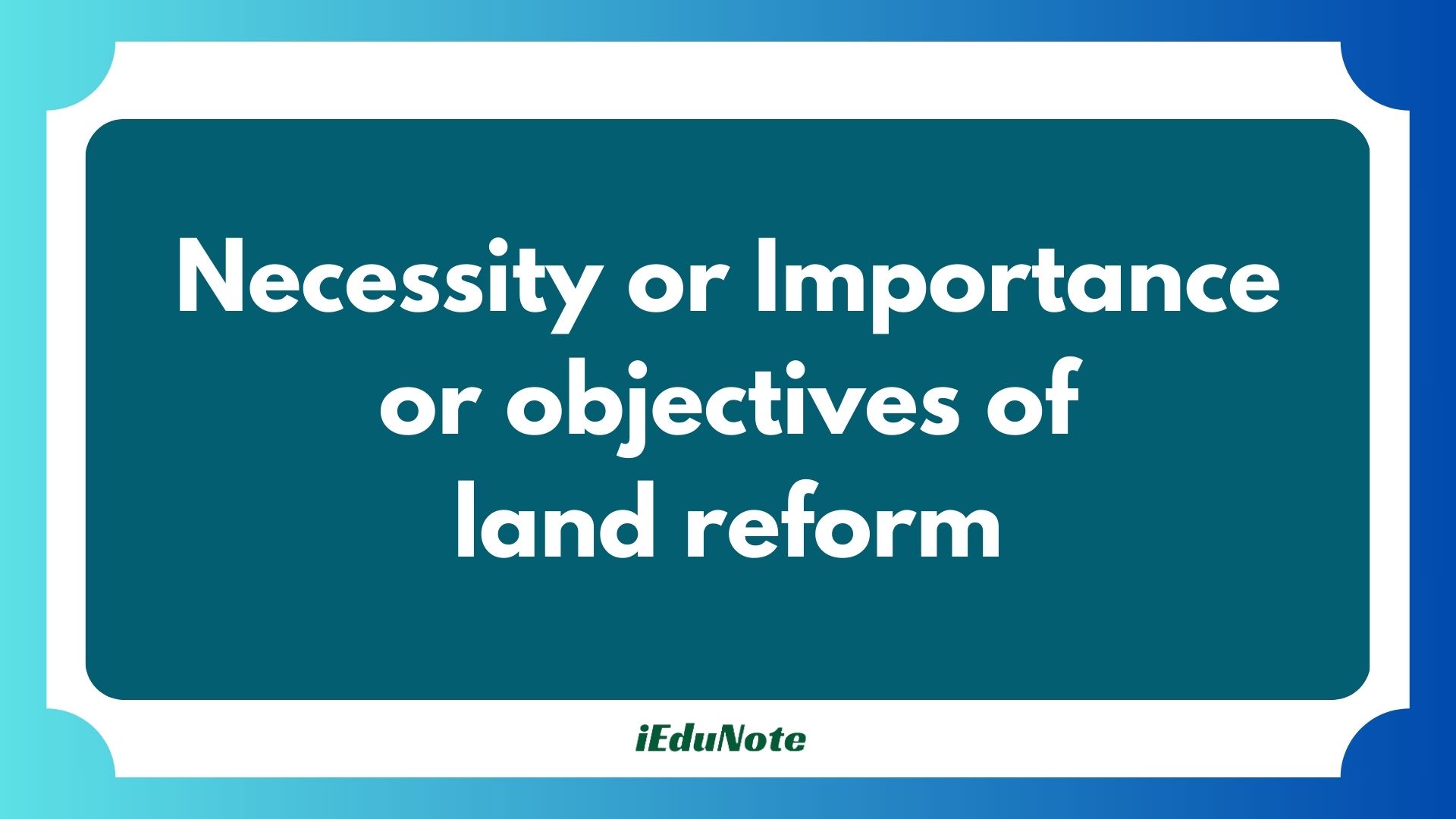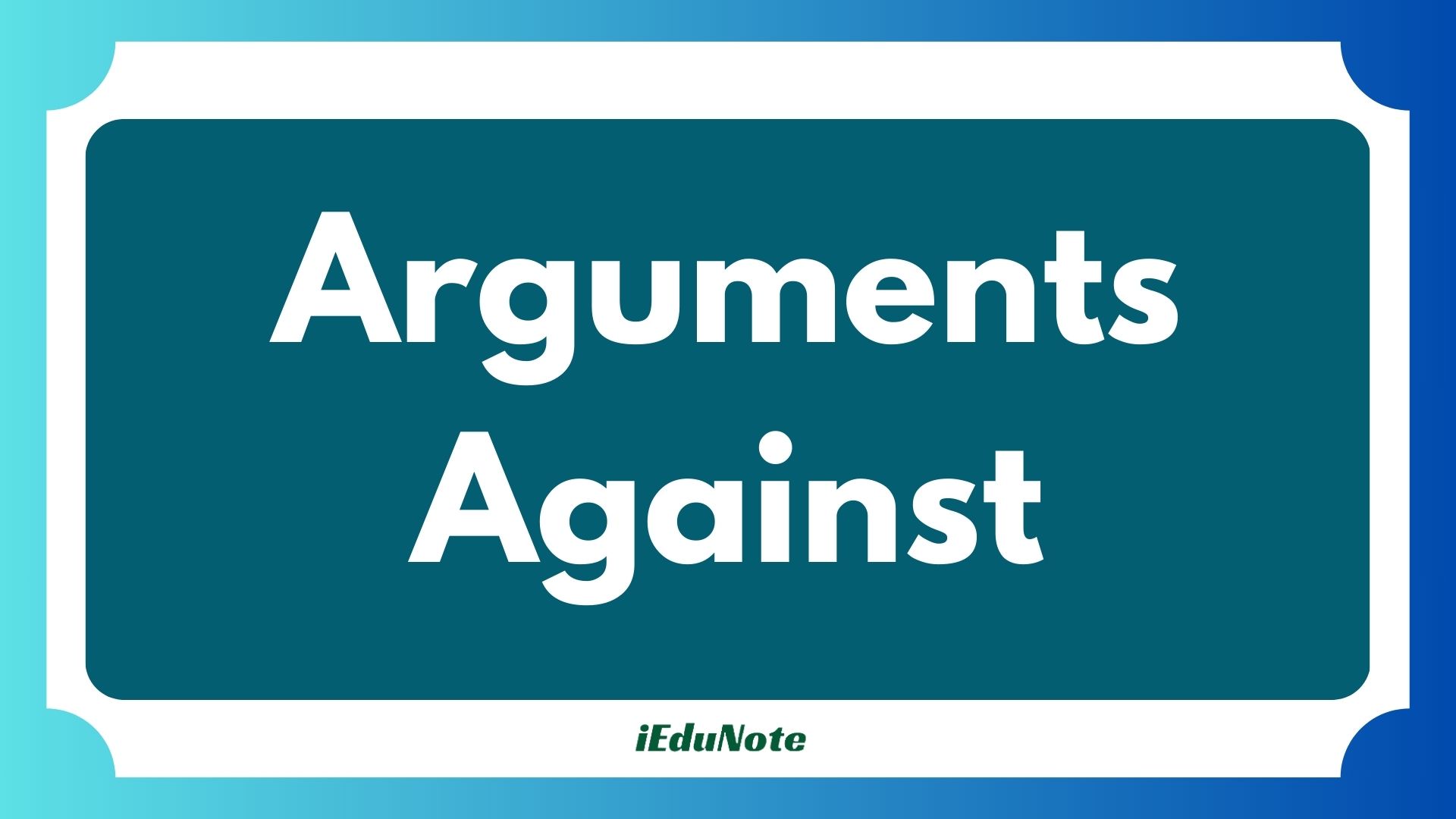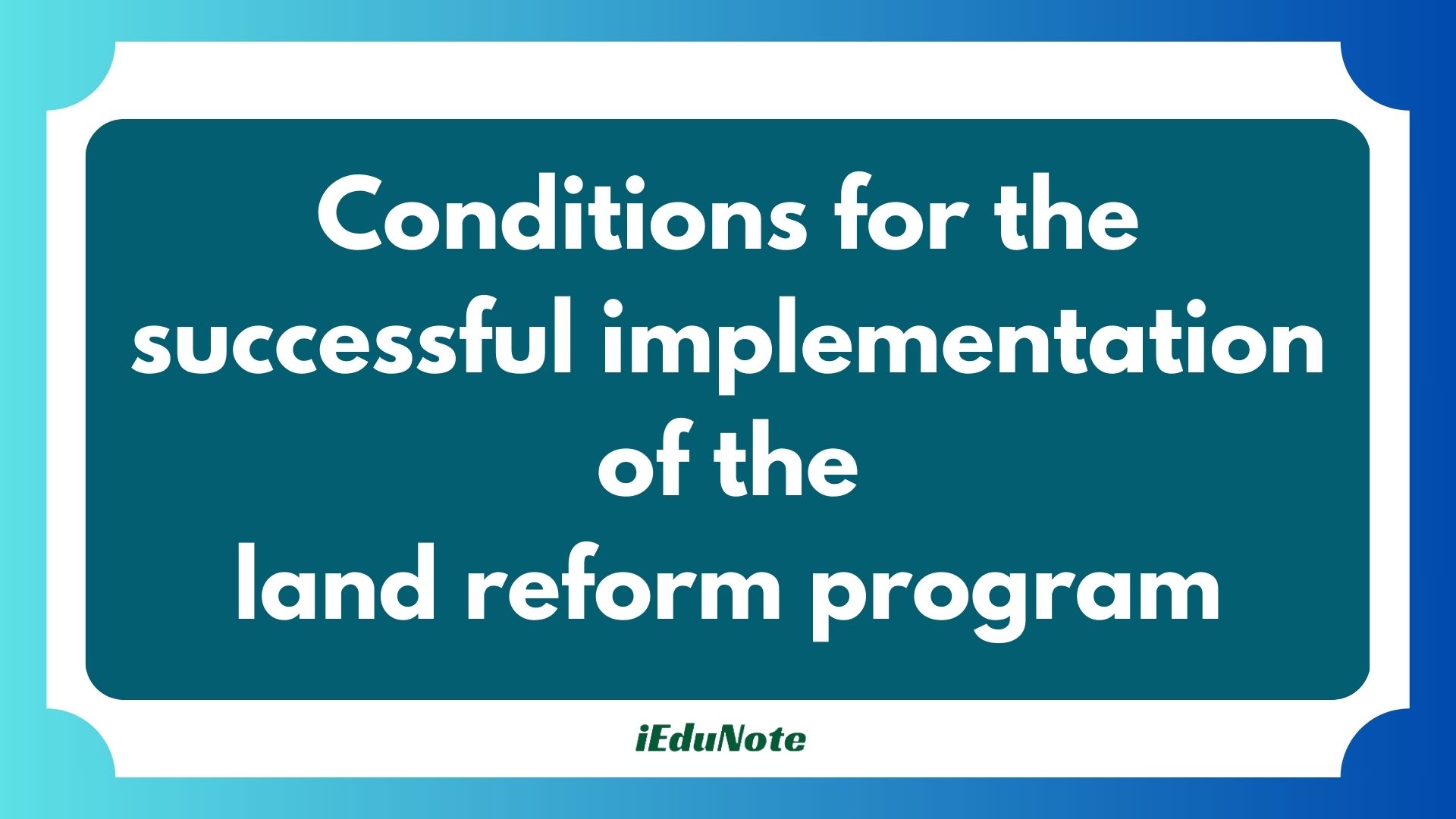The reformation of the land tenure system through the formulation of law by giving up the defective issue of traditional land tenure systems in favor of the interests of agriculture and related farmers is termed land reform.
Summing up all, the determination of the ceiling of the maximum land ownership, giving ownership of land to the real farmers, developing a good relationship between the government and the population, protection of subdivision and fragmentation of land and accumulation of holding, preserving the interests of the share-croppers, determining the minimum wage rate of agricultural labor are the subject matters of land reform.
Difference between land reform and agricultural reform

There are some basic differences between land reform and agricultural reform:
Definition
Land reform means formulating appropriate laws in favor of agriculture and farmers to bring about a revolutionary change in agriculture.
On the other hand, agricultural reform means bringing about a revolutionary change in the agricultural system. Here, the supply of agricultural inputs, adopting price policies, creating storage facilities, marketing facilities, and agricultural research are included in agricultural reform.
Concept
Agricultural reform is related to agricultural development and is a wider concept
whereas land reform is relatively a narrow concept and is a part of agricultural reform.
Subject matter
Land reform includes only land ownership, distribution of land, transactions of land hereditary, and changes in the law regarding rent.
On the other hand, agricultural reform concepts include land reform, farming related to production, and their changes.
Steps
Agricultural reforming steps are taken in agricultural development. It is a capital process; on the contrary, land reform is a part of the agricultural development process.
Without land reform, the agricultural development process cannot be completed.
Nature
Land reform is a necessary condition for agricultural reform, but it is not a sufficient condition because land reform pertains only to the reformation of the land tenure system of a country.
Whereas agricultural reform pertains to any step that may influence any change in the agricultural situation.
Necessity or importance or objectives of land reform

Bangladesh is an agrarian country. Most people in the country are directly or indirectly dependent on agriculture. In the national income, the agriculture sector has a 55% contribution.
Therefore, overall development is closely related to agricultural development. The necessity of land reform in Bangladesh is discussed below:
For equal distribution of land
The per capita land in Bangladesh is 0.28 acres. However, the majority of landowners are a few landlords who make up only 2% of the population and own 25% of cultivable land.
Meanwhile, 50% of cultivators are the owners of only 2% of the land. For increasing agricultural production, reasonable and proper land reform is necessary to alleviate poverty.
Protection of the subdivision and fragmentation of land
The problem of subdivision and fragmentation of land is increasing day by day, which poses challenges for modern technology in cultivation and prevents an increase in per-acre yield.
Proper land reform and the accumulation of holdings should address these problems to solve food-related issues.
Preservation of the interests of sharecroppers
In Bangladesh agriculture, there is the provision of sharecropping for landless, marginal, and medium farmers, and landlords. However, there is no legal support for preserving the interests of sharecroppers.
As a result, rich farmers and landlords often deprive landless and marginal sharecroppers of their legal dues and rights. Preserving the interest of tenants through proper land reform is necessary to increase productivity.
Rehabilitation of landless farmers
Approximately 40% of farmers in Bangladesh are landless. Their numbers are increasing, and they often work as agricultural laborers on the land of wealthy farmers and landlords.
They live in poverty without social security and are not established in society. Proper land reform is essential for the rehabilitation of these uprooted people.
For removing the problems of marginal farmers
In Bangladesh, marginal farmers live in poverty similar to landless farmers. Extreme poverty can push marginal farmers into becoming landless.
A proper land reform program is necessary to provide legal solutions to the problems faced by marginal farmers.
For determining the upper ceiling of land ownership through social justification
The current upper ceiling or maximum land ownership limit of 100 bighas is considered too high based on Bangladesh’s land-man ratio. Proper land reform should determine a maximum land ownership limit that is acceptable.
To establish legal or appropriate agricultural wage rates
Agricultural laborers in Bangladesh are deprived of appropriate wage rates, leading to a lack of incentive to work and a tendency to shirk responsibilities. Proper land reform should provide legal wage rates for agricultural laborers.
Removal of non-farmers from agriculture
Many people in Bangladesh who are not dependent on agriculture for their livelihood own large amounts of land, some acquired through illegal means.
To promote agricultural development, this system should be stopped, and government policy should favor “land should be to the tillers.” Proper land reform can address this issue.
Introduction to cooperative farming
Bangladesh, being an agro-based country, is not self-sufficient in food production. To achieve self-sufficiency in food, modern agricultural practices are needed.
Cooperative farming is essential for this, but it has not been widely adopted despite being emphasized in the 1972 land reform program. Policy formulation through land reform should promote cooperative farming.
Distribution of Khas land
Influential individuals have occupied government-owned Khas land in Bangladesh. This land should be distributed among marginalized and landless farmers, a task that can only be accomplished through a public interest-oriented land reform program.
Arguments for and against land reform
Land reform is a deeply political process, and many arguments for and against it have emerged. These arguments vary tremendously over time and place.
For example, in the twentieth century, many land reforms emerged from a particular political ideology, such as communism or socialism.
Or, as can be seen in the 19th century in colonized states, a colonial government may have changed the laws dictating land ownership to better consolidate political power or to support its colonial economy.
In more recent times, electoral mobilization and the use of land as a patronage resource have been proposed as possible motivations for land reform efforts, such as the extensive re distributive land reforms of Robert Mugabe in Zimbabwe.
Arguments For

Today many arguments in support of land reform focus on its potential social and economic benefits, particularly in developing countries, that may emerge from reforms focused on greater land formalization. Such benefits may include eradicating food insecurity and alleviating rural poverty.
To access formal credit
Arguments in support of such reforms gained particular momentum after the publication of “The Mystery of Capital” by Peruvian economist Hernando de Soto in 2000.
The poor, he argues, are often unable to secure formal property rights, such as land titles, to the land on which they live or farm because of poor governance, corruption, and/or overly complex bureaucracies.
Without land titles or other formal documentation of their land assets, they are less able to access formal credit.
Political and legal reforms within countries, according to de Soto, will help to include the poor in formal legal and economic systems, increase the poor’s ability to access credit, and contribute to economic growth and poverty reduction.
Formalized land rights
Many international development organizations and bilateral and multilateral donors, such as the World Bank, have embraced de Soto’s ideas, or similar ideas, about the benefits of greater formalized land rights.
This has translated into a number of development programs that work with governments and civil society organizations to initiate and implement land reforms.
Evidence to support the economic and pro-poor benefits of increased formalized land rights is, however, still inconclusive according to some critics.
To alleviate conflicting land laws
Other arguments in support of land reform point to the need to alleviate conflicting land laws, particularly in former colonies, where formal and informal land systems may exist in tension with each other.
Such conflicts can make marginalized groups vulnerable to further exploitation.
For example, in many countries in Africa with conflicting land laws, AIDS stigmatization has led to an increasing number of AIDS widows being kicked off marital land by in-laws.
While the woman may have both customary and statutory rights to the land, confusion over which set of laws has primacy, or even a lack of knowledge of relevant laws, leaves many AIDS widows at a significant disadvantage.
Also, conflicting formal and informal land laws can also clog a country’s legal system, making it prone to corruption.
Environmental benefits
Additional arguments for land reform focus on the potential environmental benefits of reform. For example, if reform leads to greater security of land ownership, through either formal or informal means, then those that use the land will be better stewards of it.
Arguments against

Intensely political process
Many of the arguments in support of land reform speak to its potentially positive social and economic outcomes. Yet, as mentioned previously, land reform is an intensely political process.
Thus, many of those opposed to land reform are nervous as to the underlying motivations of those initiating the reform.
For example, some may fear that they will be disadvantaged or victimized as a result of the reforms. Others may fear that they will lose out in the economic and political power struggles that underlie many land reforms.
Formalization of property rights
Other groups and individuals express concerns about land reforms focused on formalization of property rights.
While the economic and social benefits of formalized land rights are often touted, some research suggests that such reforms are either ineffective or may cause further hardship or conflict.
Equity issues and potential elite capture of land
Additional arguments against land reform focus on concerns over equity issues and the potential elite capture of land, particularly in regards to reforms focused on greater land formalization.
If improperly or inadequately implemented, critics worry that such reforms may further disadvantage marginalized groups such as indigenous communities or women.
These concerns also lead to questions about the institutional capacity of governments to implement land reforms as they are designed.
Even if a country does have this capacity, critics worry that corruption and patrimonialism will lead to further elite capture.
Redistributed land will not be used productively
In looking at more radical reforms, such as large-scale land redistribution, arguments against reform include concerns that redistributed land will not be used productively and that owners of expropriated land will not be compensated adequately or compensated at all.
Zimbabwe, again, is a commonly cited example of the perils of such large-scale reforms, whereby land redistribution contributed to economic decline and increased food insecurity in the country.
In cases where land reform has been enacted as part of socialist collectivization, many of the arguments against collectivization more generally apply.
Evaluation
While many issues divide proponents and opponents of land reform, the questions below can help one to evaluate land reform in a more objective manner:
- Is private property of any sort legitimate?
- If so, is land ownership legitimate, and are historic property rights in this particular state and society legitimate?
- Even if property rights are legitimate, do they allow for or protect against expropriation?
- Do they entitle the property owner to partial or complete compensation for expropriated land?
- How should property rights be weighed against other rights, such as the right to life and liberty?
- Who should adjudicate land ownership disputes?
- What constitutes fair land reform?
- What are the social, economic, and political effects of land reform?
Land Reform and Poverty Reduction
By expanding the land rights of the poor, land reform adds to their wealth and thereby reduces asset poverty. This, in turn, helps to reduce income poverty in two ways: first, by increasing the poor’s share in the agricultural income pie; and second, by increasing the total size of the pie.
The first effect is straightforward. Assets are stocks of wealth, and these generate flows of income. By redirecting an important flow – the returns to land – into the hands of the poor, progressive land redistribution augments their incomes. At the same time, assets enhance a person’s social status and political power. Land reform reduces these ‘non-economic’ dimensions of poverty, too.
The second effect is more complicated, and less certain. In the short run, land reforms can have ‘transaction costs’ that reduce agricultural output, particularly if accompanied by political instability that disrupts input supplies or access to markets.
Moreover, it may take some time for the beneficiaries to learn how best to manage their new assets. But in the long run, land reforms can increase the size of the agricultural income pie by promoting more labor-intensive farming. In other words, land reform can be a ‘win-win’ strategy that improves both equity and efficiency.
Conditions for the successful implementation of the land reform program

The successful implementation of a land reform program in any country is very important. The collection of land from rich farmers and its distribution to the poor farmers create multifarious problems.
Zimbabwe is a populous developing agro-based country, so the rapid implementation of land reform is crucial. To ensure a public interest-oriented and favorable land reform, some effective conditions must be fulfilled, as follows:
Political consensus
Although land reform is an economic program, a political consensus is needed to implement it successfully. To formulate and realize a public interest-oriented land reform that benefits marginalized and small farmers, a consensus between the government and opposition parties should be established. They should work together within the national parliament as well as outside of it.
Determination of maximum size of holding
In land reform program in determining the maximum size of holding per family very carefully. Here considering the per family members and fertility of land and maximum size of holding in urban areas and in consistence with it the maximum size of holding in rural areas should be determined to include in land reform program.
The reformation program on practical perspective
Considering the socio-economic condition of the country and for agricultural mechanization being emphasized land reform should be public welfare oriented. The surplus land should be only distributed
among the landless farmer rather the provision should be included in the land reform program so that the landless cannot sell the received land from the program.
Local committee
A land reform realization committee should be formed in upazilla level including govt, services holders, teachers, public representative, local leaders, NGO workers, social workers etc. This committee will formally arrange meeting and find out real khas land and afterwards the surplus land should be distributed among landless farmers.
Forming national cell
For formulating and realization a land reform under the control of Prime Minister a national cell should be established. Official’s members of opposition party and land specialist should be in national cell.